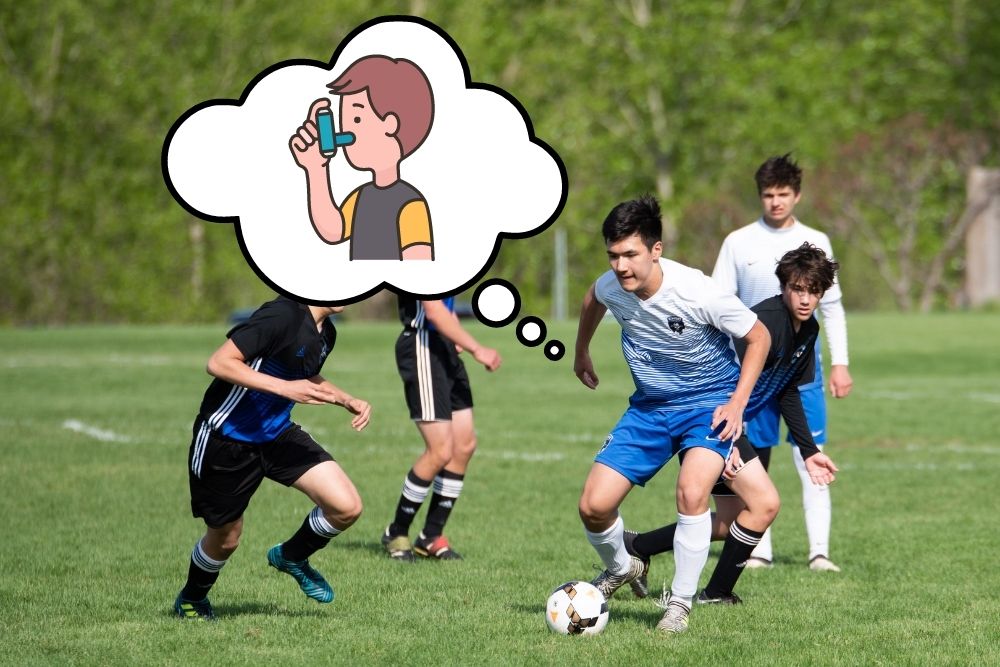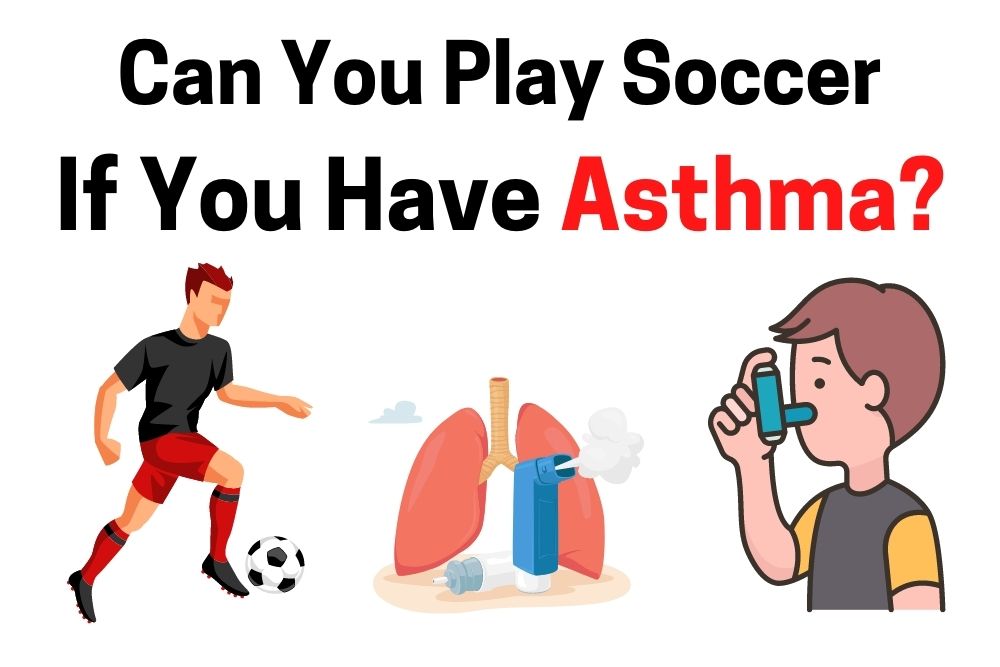Soccer is meant for everyone and anyone, but not everyone can play soccer, which might be for several reasons. Reasons can include but are not limited to health issues, psychological issues, among others.
Asthma is a disorder that causes your airways to constrict and inflate, as well as create excess mucus. It causes an uneasy feeling while breathing, resulting in whistling (wheezing) on exhalation, coughing, and breathlessness.
Asthma is mild discomfort for some people. However, for others, it can be a severe issue that prevents them from going about their everyday lives and can even lead to a severe attack that threatens life.
In the game of soccer, it is important that a player knows how and is able to breathe properly while playing. However, asthma is an obvious constriction to how well a soccer player can breathe.
But with this condition, is it possible to have a successful soccer career? Providing answers to this question is the aim of this article, which considers many things.
Quick Navigation
Can You Play Soccer If You Have Asthma?
Asthma is one of the most commonly known ailments globally, while soccer is one of the most famous sports.
The game of soccer is exciting, and its influence of interest does not only catch the fancies of the healthy human alone. Even the disabled show their love towards the game.
Another vital thing to note is that participation in soccer is not the same due to different reasons, and health problems are one.
The severity of asthma is different, which will make the answer to the question of this article (can you play soccer if you have asthma) subjective. Because to answer the question, there is a need to consider so many factors.
This article is dedicated to shedding light on the feasibility of asthmatic patients being physically engaged in soccer. Also, the article will make the reasons known and, if it is feasible, how can it be safely done.
In order to get the idea right, there is a need to delve more to know about the asthma condition.
Asthma is a type of inflammatory condition that affects the lungs’ airways. When affected, catching your breath and some physical tasks become difficult or unattainable.

It is confirmed that around 25 million citizens of the United States of America have asthma. The Centers for Disease Control and Prevention (CDC) confirmed the statistics.
In severe cases of asthma, speaking or even being active might be difficult. Your doctor may refer to it as a chronic respiratory condition.
Asthma is also referred to as “bronchial asthma”. Asthmatics have symptoms when their airways become constricted, inflamed, or clogged with mucus.
In normal respiration, the bands of muscle around your airways are in a relaxed position, allowing the flow of air to pass freely. However, asthma makes it more difficult for air to move through.
As a result of asthma, the bronchial tubes in your lungs become red and inflamed. In addition, the inflammation that comes as a result of asthma has the potential to harm your lungs.
Furthermore, asthmatic patients frequently have sensitive airways that tighten and restrict even when minor triggers are present.
Everyone with the condition will not experience all the symptoms of asthma. You should also be mindful of the fact that even if your asthma is managed well, there is still a possibility that you may still suffer a flare-up of the asthmatic symptoms from time to time.
Quick-acting therapies, like an inhaler, can help with flare-ups and help in such situations, but severe asthma issues may require medical care.
Most people do not get asthma until they become adults, even though it is more common in youngsters.
Asthma has yet to be linked to a single cause. Instead, researchers believe that several factors are responsible.
The factors can include genetic transfer. For children of asthmatic patients, it is possible that they also have the same condition.
Another factor can also be virus infections in the past. People who have had severe virus infections as a kid like respiratory syncytial virus infection (RSV), are at a higher risk of developing the disease.
This idea explains why newborns’ immune systems don’t grow strong enough to battle asthma and other allergy disorders if they are not exposed to enough microorganisms in their early months and years.
Asthma can be treated with a variety of drugs. Bronchodilators are the most frequent therapy used in the short term to treat asthma attacks. They might also be used in the long term to control symptoms.

Asthma flare-ups can also be reduced by making lifestyle modifications. Dietary modifications, exercise, and stress management are all examples of this.
It is best to consult your doctor to determine your kind of asthma and the best medication and management choices for you.
With all that has been said about asthma, some soccer players who have the condition have been actively participating in the sport.
Even some of the elite soccer players, who have made a name for themselves and have written their names in gold, are also found to be asthmatic patients.
According to research, more than a quarter of professional soccer players tested from major clubs throughout England had exercise-induced asthma (EIA). The study by the Royal Brompton Hospital and University of Kent, London, happens to be the first of its kind in scope and scale.
Can you play soccer with exercise-induced asthma?
One of the questions that come to mind while discussing the issue of asthma is if we can have soccer players who have exercise-induced asthma (EIA). It is essential to know if people with this condition can play soccer.
Strenuous activity narrows the airways in the lungs, causing exercise-induced asthma. It produces shortness of breath, wheezing, coughing, and other symptoms during or after exercise.
Exercise-induced bronchoconstriction happens to be the preferred term for this condition.
Exercise is likely just one of the numerous things that might cause breathing problems in people with asthma. For example, soccer is a type of physical exercise that can potentially provoke this type of asthmatic disease.
Exercise-induced bronchoconstriction affects around 90% of asthma patients. However, this ailment can also affect people who do not have asthma.
Exercise-induced bronchoconstriction can affect anybody, although it is more common among high-level athletes.
The air we inhale is warmed and moisturized by the nasal cavity during regular respiration. But, when people exercise, they inhale cooler and drier air because they breathe in and out through their mouths.
The muscular bands around the airways are sensitive to variations in temperature and humidity in exercise-induced asthma, and they contract, narrowing the airway.
People with exercise-induced asthma can play soccer, but under close supervision and with the knowledge of the coach and teammates.
An asthmatic person can still pursue their dream of becoming a soccer player. However, there is a need for extra caution if you are aware of having this condition.

This is because things might go wrong or even worse if the patient with exercise-induced asthma is not taking extra precautions.
Elite soccer player like David Beckham is an English soccer genius who would have gotten his career truncated by this condition (exercise-induced asthma).
But with precautions, the help of his manager and teammates, he was able to nurse his glorious career to the highest level anyone can imagine.
He was one of the important figures in the Real Madrid Galactico era with teammates of the likes of Zinedine Zidane, Figo, Raul, the Brazilian Ronaldo (R9), among many others.
They were nightmares for any team at the time to play against and David Beckham was an essential figure in that.
During the old glory days of Manchester United, one of their most essential midfield commanders, Paul Scholes, was also diagnosed with asthma when he was only twenty years of age.
He was one of the most decorated midfielders in the famous English Premier League under the management of the maestro coach Sir Alex Ferguson. Paul Scholes does not keep his medical condition of being asthmatic a secret at all.
He even revealed to a reporter how his asthma is well managed. He does not trivialize the part of taking his medications as often as possible to salvage the medical condition.
He also told the reporter that he warms up ahead of the start of each match and takes his medication at the beginning of each game and the halftime break if necessary.
Even the Chelsea Football Club’s all-time goalscoring midfielder and former manager, Frank Lampard, is also asthmatic.
Although he has been diagnosed with this medical condition since he was a kid, he did not give up on his childhood dream but fought through the thick and thin of his condition.
Lampard was able to get to the peak of the career he dreamt of playing at the very highest level in his soccer career and leaving to be one of Chelsea’s highest goalscorers of all-time and arguably the best player to play soccer ball wearing Chelsea’s jersey.
With all the examples of great players who have made an incredible impact in the world of soccer, it is safe to say asthmatic patients and even those with exercise-induced asthma can have a successful career in soccer.
How Do Asthmatics Train For Soccer?
There is a need for each soccer player to get involved in soccer training because any team without preparation will pay for it on the pitch as there will be lapses in their performance.
If an asthma condition is capable of excluding its patients from training, it is capable of excluding them from performing on the soccer pitch. This is why training is compulsory for any player who is ready to be involved in a soccer game regardless of their medical conditions.

Due to the peculiarities of asthmatic conditions, individuals who have these conditions are meant to be cautious and are required to take some steps ahead of time to be able to manage their conditions.
It should be noted that only asthmatic patients who are not battling with the severe case of asthma are permitted to train for soccer. This is because the severe case can cause the patient bigger setbacks if strenuous activities are done.
Consult your doctor before beginning your training regimen. As a professional, he or she will assist you in determining which activities are most appropriate for you and which ones you should utterly avoid.
Your doctor will devise a plan of action that will instruct you on things to do before exercising and things to do if you experience asthmatic symptoms while exercising.
To train as an asthmatic, you should have all your teammates and coach informed about your health condition. This is a way of preparing the minds of your teammates and coach ahead of any bizarre symptoms which might require medical attention and help.
This will also help the team to be ready for any case of emergencies. Another necessary thing for an asthmatic to get before training is medications.
An inhaler is an example of a medication that must not be far from the disposal of an asthmatic at any time.
- Relief for Mild Symptoms of Intermittent Asthma.
Last update on 2023-11-11 / Affiliate links / Images from Amazon Product Advertising API
To have a hitch-free training or even match performance, an asthmatic ought not to trivialize his or her treatment. One of the aims of asthma therapy is to assist you in leading a natural and healthy lifestyle, including working out and getting involved in other forms of physical activity.
This aim may be achieved by taking your prescribed medications. You should also avoid anything that is a trigger for your asthmatic symptoms—and monitor your symptoms closely as well as your lung function.
Consult your physician if your asthma symptoms prevent you from fully participating in activities. A minor adjustment to your asthma action plan may be all that is required to offer asthma relief when exercising or engaging in other activities.

Also, before launching to the deep of training, an asthmatic is required to have some minutes of warm-up. This will help condition his or her body to the rhythm of the activity he or she is about to get involved in.
Do not train in a cold environment. If there is a sudden change in weather and the environment is cold, it will be better if you have your training indoors.
Having yourself in a warm condition is a must and do not try to risk health by staying in a cold environment.
The reason is that it might trigger the symptoms of asthma and it can worsen your well-being and lead to a severe stage of the asthmatic condition.
Do not expose your body while training. Get a head warmer or a scarf to cover your head and your mouth.
- Carhartt Company Gear Collection
- Fleece hat featuring logo tag, ear flaps, and pull-down face mask with moisture-wicking backing
- One size fits all
Last update on 2023-11-10 / Affiliate links / Images from Amazon Product Advertising API
This will help you get warm and prevent you from breathing in dry and cold oxygen, which might be unfiltered when breathing in through the mouth.
Do not trivialize good feeding. Eating well has a lot to do with managing your asthmatic condition.
Before you go for a training session, make sure you eat well and take water, preferably warm. Stay away from cold water because it can trigger symptoms of your condition.
Conclusion
Asthma is a very common ailment in the United States of America and the world generally. And a lot of people think this ailment can mark the end of them being engaged actively with their beloved sport, soccer.
But, with a lot being said, asthmatic patients can still play soccer depending on the level of severity. Even for the ones with mild level, there is a lot of precautions required. Patients with exercise-induced asthma can still play soccer.
Some elite soccer players have laid a very good example by playing soccer with asthmatic conditions and reaching a very high level in their soccer career—players like David Beckham, Frank Lampard, Paul, Scholes, among many other successful players.
Hi there, I’m Jay.
Soccer is everything in my life! My friends and I have created this blog with all our enthusiasm, passion, and understanding after years of playing pro soccer. Hope you will enjoy it!


